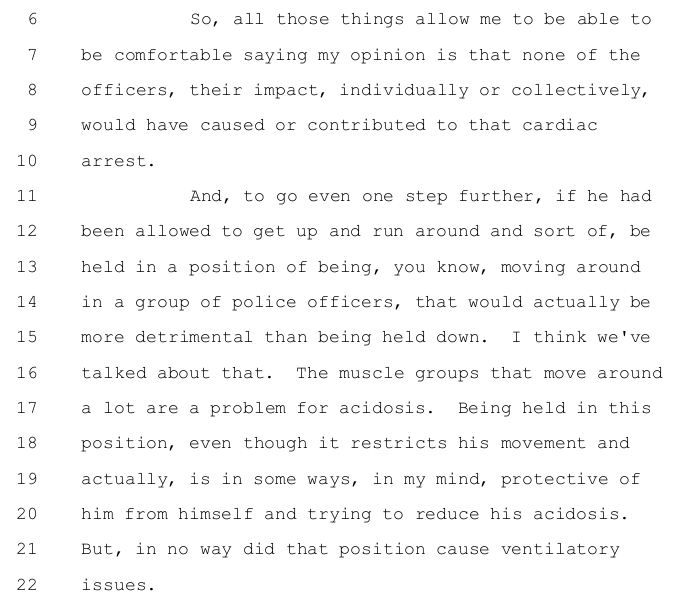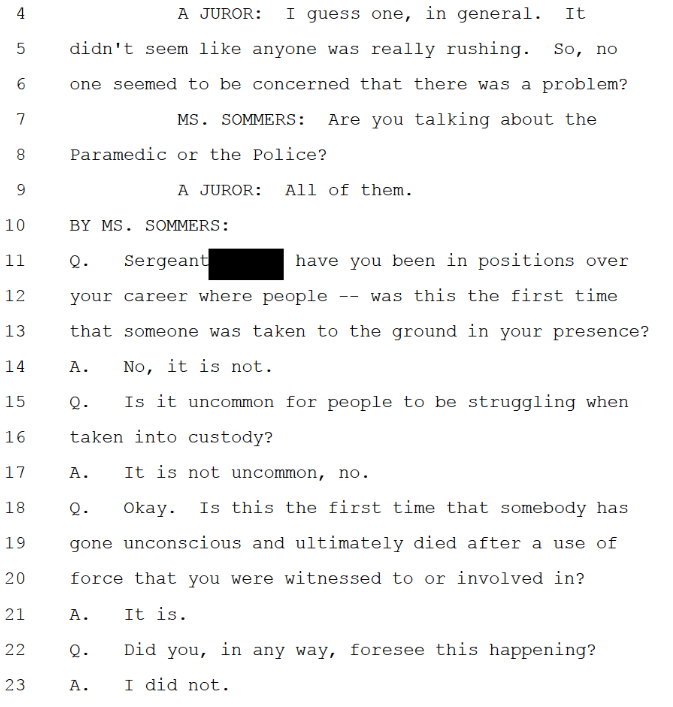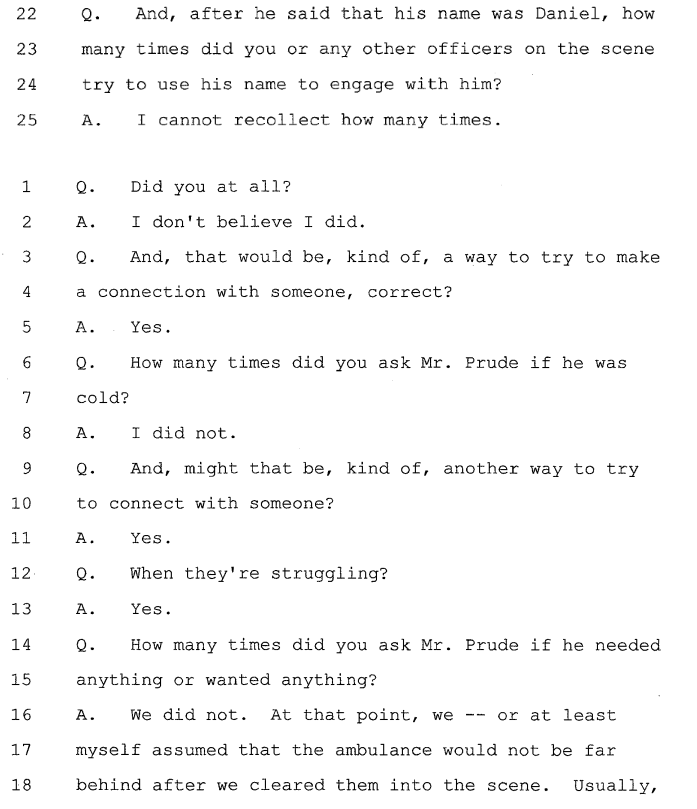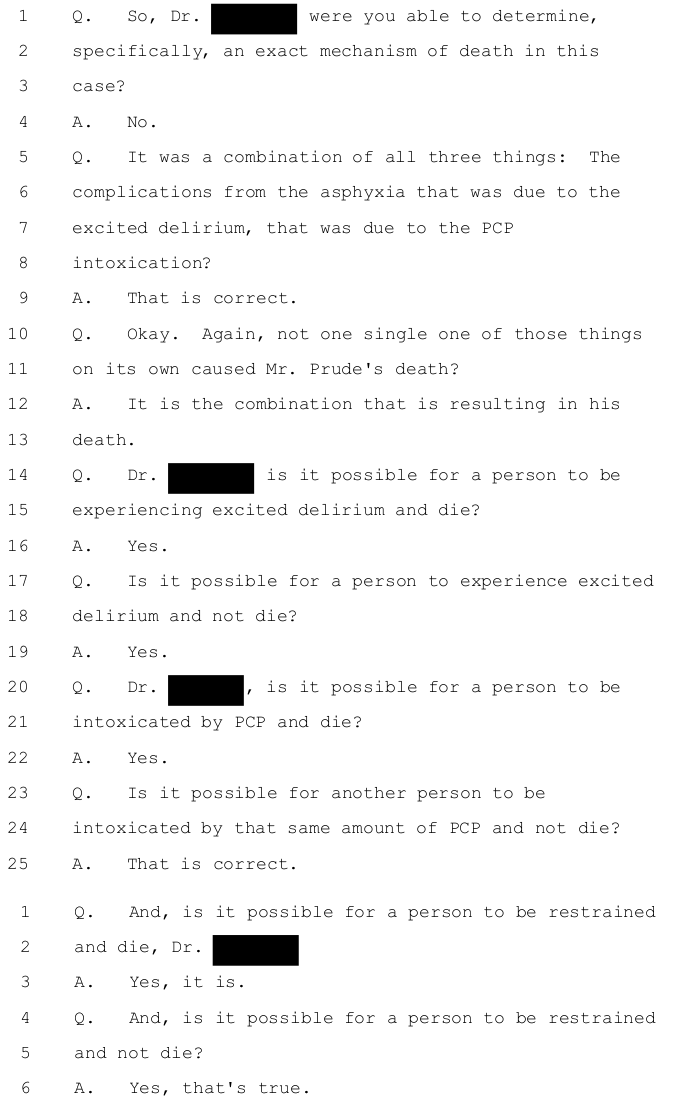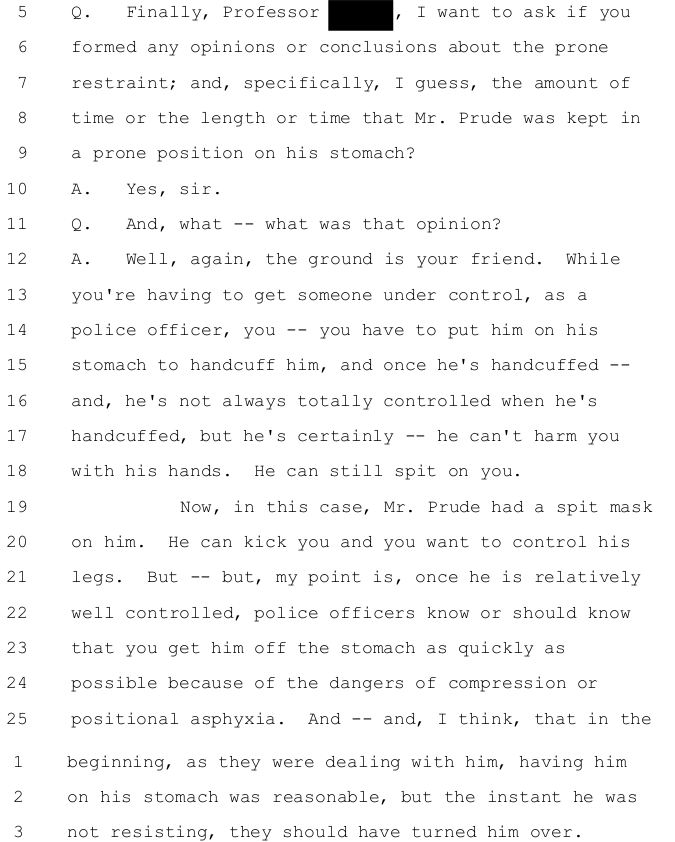How the NY Attorney General's defended the police who killed Daniel Prude
Primary tabs
Earlier this month, the NY state Attourney General's office released the transcripts of the grand jury trial investigating the death of Daniel Prude. While reading through them, I was reminded again and again of a Noam Chomsky quote: "In political discourse every term has two meanings: an official meaning and it's opposite and it's the opposite meaning that's normally used". The official title for the lawyers from the NY Attorney General's office was "prosecutor", but the reality was they acted as the defense for the police. A dig through the transcripts shows how they did it.
Present Highly Questionable Evidence as Fact
The prosecutors presented Dr. Gary Vilke as one of their two expert witnesses. Vilke's is a highly controversial researcher that frequently provides testimony in defense of the police. He has testified in dozens of cases where suspects have died while being restrained by the police. Vilke nearly always finds the same result: the police officers did nothing wrong. Vilke has stated that it was doubtful that Derick Chauvin's actions caused George Floyd's death, whch was highly disputed by the expert witness for the prosecution in that trial. In the grand jury trial for Daniel Prude's death, Vilke testified that the police were justified in their actions as expected, but didn't stop there. He further claimed that it was basically impossible for them to be at fault, because it is always safe for human beings to have up to 225 lbs of weight on their backs for over four minutes. He followed than one up with the even more unbelievable claim that the police were actually helping Daniel Prude.
Vilke testified along with many others about "excited delirium." Like Vilke himself, this medical syndrome is surrounded in heavy controversy. Excited delirium is not recognized by vast majority of medical professionals, including the American Psychiatric Association and American Medial Association. Critics of the term argue that it should be called "sudden death in restraint syndrome", since it's frequently used to explain deaths that happen while police or other authorities are restraining someone. They also point out the parallels between traits of excited delirium and stereotypes of black people used to justify violence against them: super-human strength, immunity to pain, animalistic behavior, etc. Finally, they point to the term's dubious history. Medical examiner Charles Wetli, a promoter of the modern use of the term, claiming that excited delirium killed 32 black women in 1980s Miami. Many of the women work were sex workers and Welti told journalists the women died from having sex during excited delirium (although males were never affected). In 1992 police identified the serial killer who actually killed the 32 women.
Many other outlets have already done excellent stories on these issues. Vilke was discussed in the Evan Dawson interview with attorneys Natalie Ann Knott and Don Thompson. Current Affairs also recently published a great article on excited delirium.
Let the Police Tell Their Narrative
The grand jury transcripts contain hundreds of pages of testimony from the police. Almost all of them involve the police simply telling their point of view, with little to no pushback or aggressive questioning from the prosecution. This invited the jury to see the world through the eyes of the police. In this world the Bad Guys frequently escape handcuffs while being pinned to the ground and the police pin people to the ground for their own safety. The prosecution's role was generally to assist the police in constructing this narrative by asking helpful questions. In some cases they redirected questions from the jury so that the answers could fit the narrative.
Of course, the attorneys still had the official title of "prosecutor," so they needed to at least act like they were doing their official job. At some point they needed to ask some tough questions.
There are a couple things to note about this line of questioning. One is that it was extremely rare. The there was over 150 pages of testimony from the two accused officers, maybe 20 pages of that consisted of questions like these. There were also testimony from around 20 other police officers and they never faced tough questioning. Secondly, this questioning seemed to be solely focused on issues that didn't affect the guilt or innocence of the officers. The above example tries to establish that the officers weren't empathetic enough, but the prosecution's case doesn't rest on that question. The critical questions, which were given as jury instructions after all testimony was over were: 1) were the officer's actions part of a chain of causes that resulted in Daniel Prude's death? 2) was the officer's use of force justified because it was necessary to effect the arrest? There were plenty of critical questions that could have been asked along those lines, but the prosecution focused elsewhere.
Mixed in with the tough questions were more questions designed to help the officers construct their narratives. For example this question where the prosecutor and officer construct a narrative together where the police always need to "control" a suspect, since any signs of complains could just be fake.
Distract From the Autopsy
The medical examiner's first finding on the autopsy report was "Complications of asphyxia in the setting of physical restraint." This could be quite damaging to the police officer's defense so the prosecution highlighted the other findings on the autopsy report: excited delirium and PCP intoxication. The argument was basically that all of the things should be weight equally since any of them could potentially kill someone. The medical examiner seem very happy to go along.
This argument ignores a couple of serious issues. The first one is the specifics of what happened to Daniel Prude. Danial Prude was not simply "restrained", he was pushed face down into the pavement on a freezing cold day and held there even after the police noticed that he was having medical issues. The second is it ignores the key medical question: was the police's pinning of Danial Prude part of a chain of causes that resulted in his death? Theoretical questions like "can PCP kill someone" are irrelevant to that question. The prosecution choose to not to ask this question to the medical examiner. In theory the jury could have asked a question like that, but they were not informed of its importance until all testimony was over.
Ignore the expert witness testimony of police misconduct
The last piece of evidence that the prosecutors needed to deal with was the testimony of Geoffrey Alpert, a PhD of criminology. Alpert is not "anti-police" in any sense, but he does have mild criticisms of them. For example in an Atlantic article he pushed for ending qualified immunity, better data collection, and more police training. Alpert testified that the police actions were "unreasonable and against police practice," in other words they were unlawful. According to Alpert, the police behavior has reasonable at the start of the arrest, but once they officers had Daniel Prude on the ground, with his legs controlled, there was no more reason to pin him down and he should have been moved to the "recovery position" on his side. He further argued that once Daniel Prude was vomiting on the ground there was "no excuse" for not rolling him over on his side.
The main way the prosecution dealt with this was to ignore it. They didn't dwell on Alpert's statement that the actions were "unreasonable and against police practice." They didn't use his arguments to question the police officers. For example, they would ask "have you ever seen someone in handcuffs escape," rather than "how likely is it that Daniel Prude would have escaped if you would have rolled him over and held him by his legs." In general, they just dropped the themes of his argument, in contrast to things like excited delirium and PCP which they brought up over and over.
No Idictments
The jury voted 15-5 in favor of no charges for any of the police officers. Would this be different if the prosecution employed a different strategy? That is an open question. What is abundantly clear though is the strategy that Letitia James' Attorney General's office employed was not designed to indict anyone. The strategy was designed to defend the police and, in this case, it worked.

